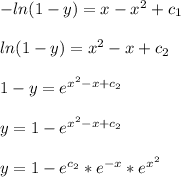Answer:

Explanation:
We begin with the differential equation

Firstly, we need to get the
 and
and
 as well as the
as well as the
 and
and
 on the same sides as each other
on the same sides as each other
To do this, we can multiply each side by
 and divide each side by
and divide each side by

Doing this will give us the following differential

Now, we can integrate each side

Now, we need to solve for y
